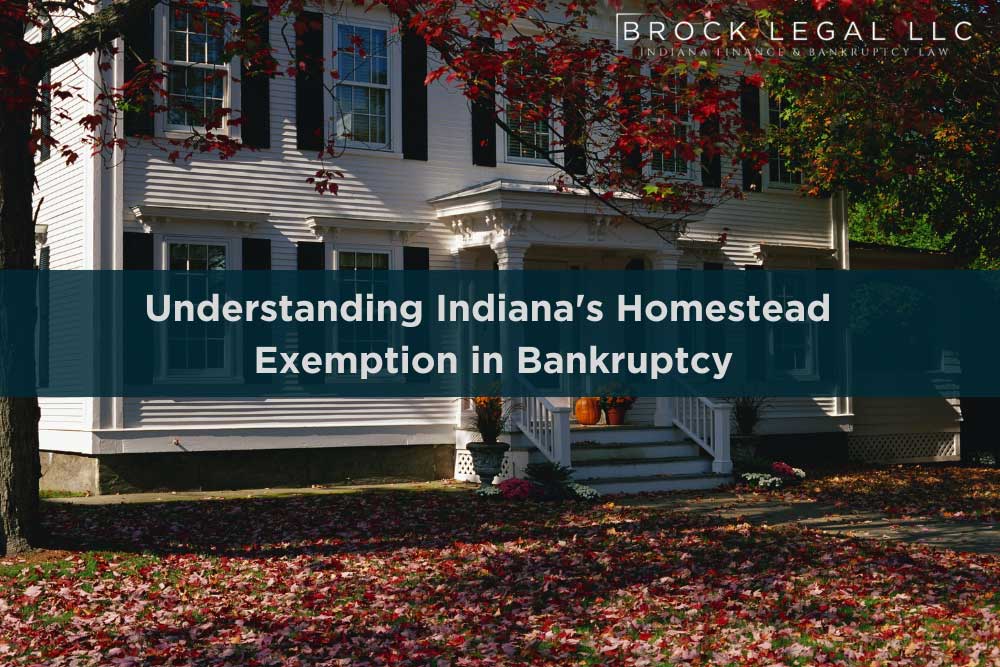Understanding Indiana’s Homestead Exemption in Bankruptcy
by Attorney S. Zachary T. Brock

Table of Contents
Indiana Homestead Exemption in Bankruptcy: Protecting Your Home in Indianapolis
Your home means stability. When debt grows and you consider bankruptcy in Indiana, the homestead exemption helps protect your residence. It can shield a portion of your home equity from creditors so you can keep a safe place to live while you reset your finances.
This guide outlines how the Indiana homestead exemption works in Chapter 7 and Chapter 13, who can claim it, and how to avoid mistakes. It is for families in Indianapolis, Carmel, Fishers, Greenwood, Lawrence, Avon, Plainfield, and nearby cities who want clear steps and plain language.
How the Indiana Homestead Exemption Works in Chapter 7 and Chapter 13 in Indianapolis
Indiana homestead exemption basics in bankruptcy
The homestead exemption protects equity in your primary residence up to a dollar limit set by Indiana law. Equity is the value of your home minus what you owe on mortgages and liens. If your equity is at or under the limit, a Chapter 7 trustee usually cannot sell the house to pay creditors. In Chapter 13, the exemption helps shape your plan payment by reducing the amount of nonexempt equity you must cover for unsecured debts.
Homestead exemption in Indianapolis Chapter 7
In a typical Chapter 7, we measure fair market value, subtract mortgage balances, and compare the remaining equity to the homestead cap. If the equity fits within the cap, your home is protected. If equity is above the cap, we look at tools such as lien avoidance, valuation support, and exemption stacking with a spousal claim to keep you in the home.
Homestead exemption in Indianapolis Chapter 13
In Chapter 13, you do not lose your home. Instead, your plan must be at least as good for unsecured creditors as a Chapter 7 would be. The bigger your nonexempt equity, the more your plan may need to pay. A strong exemption position keeps plan costs stable and supports a payment you can afford.
- Equity math and appraisals: We use recent sales and, when helpful, a licensed appraisal to document value so your filing reflects a supportable number that aligns with your exemption claim.
- Liens and arrears: Mortgage arrears and valid liens reduce equity. Accurate payoff letters matter. We verify figures and update schedules before filing.
- Married filers in Indiana: Spouses who both have an interest in the home can each claim the homestead exemption, which can increase the protected equity and lower plan pressure.

Who Can Claim the Indiana Homestead Exemption and What Property Qualifies in Bankruptcy
Residency and property type in the Indianapolis area
The homestead exemption applies to your real residence. It covers a house, condo, or a mobile home used as your primary residence. Seasonal homes and rentals do not qualify. You need to live in Indiana to use Indiana exemptions. If you recently moved, timing rules may apply.
Title, occupancy, and co owners in Indiana
You must have a legal interest in the property. If you are on title but do not live there, the homestead exemption is not the right fit. If you live there but are not on title, we may need to review deeds, divorce orders, or land contracts before filing. Co owners who live in the home can sometimes stack exemptions, but that depends on how the title is held and who is filing.
- Proof of occupancy: Utility bills, driver license address, voter registration, and tax returns help establish that the home is your real residence.
- Recent moves and the 730 day rule: If you lived in another state within the last two years, federal rules may require you to use the other state’s exemptions. We check the timeline before we claim Indiana’s homestead.
- Mixed use property: If part of the home is used for business or rental, we break out the numbers to show the residential share that qualifies for the exemption.
Calculating Equity for the Indiana Homestead Exemption in Bankruptcy in Indianapolis
Step by step equity check in Indianapolis
A careful equity calculation prevents surprises. We gather documents and run a simple model before we decide whether to file Chapter 7 or Chapter 13. First, find a current value using comparable sales and, if needed, an appraisal. Avoid inflated estimates. We want supportable data that a trustee will accept.
Next, list all liens, including first and second mortgages, home equity loans, judgment liens, and unpaid property taxes. Request recent payoff letters with per diem interest.
Then compute equity by subtracting all valid liens from the value. Compare the result to the Indiana homestead cap for your filing. If spouses both qualify, consider stacking.
In Chapter 7, also think about realistic sale costs when a trustee weighs liquidation. That reduces net equity and can change the analysis. Finally, stress test the numbers with a low, mid, and high value case to see how much cushion you have. If the high case still fits the exemption, you are in a safer zone.

Common Mistakes With the Indiana Homestead Exemption and How to Avoid Them in Bankruptcy
Pitfalls we see in Indianapolis filings
Most issues come from rushed filings or missing records. Planning and clean schedules fix both problems.
- Transferring an interest before filing: Moving title to a spouse or relative can trigger look back issues and create avoidable risk. Talk to a lawyer before you transfer anything.
- Overstating value: Relying on a high estimate may push you over the cap. Use comps or an appraisal that reflects condition and the market in your zip code.
- Ignoring judgment liens: Old judgments can attach to your home. We run a title check and, when allowed, file to avoid a lien that impairs your exemption.
- Forgetting mobile home rules: If your primary residence is a mobile home, special rules can apply. We confirm the title and location details early.
- Assuming Chapter 13 always solves equity: Chapter 13 can protect the house, but a large nonexempt equity number may increase plan cost. We model both chapters first.
Timing and homestead planning in central Indiana
If you are close to the cap, small choices can matter. Paying down unsecured debt before filing may not help and can even hurt your case. Fix priority items like taxes or car repairs that keep you safe and working, and let us structure the filing date once the numbers are clear.

Indiana Homestead Exemption and Other Key Indiana Bankruptcy Exemptions in Indianapolis
How your homestead claim fits with other Indiana exemptions
The homestead is one piece. Indiana law also protects certain personal property and retirement assets. When we assemble your schedules, we match each asset to the right line so you keep daily life stable. Tangible personal property is listed at honest thrift values. Vehicles and tools that support your work are addressed with the right exemptions. Tax qualified retirement accounts are usually protected in full. When available, wildcard rules can help protect small amounts of cash or a modest account that does not fit elsewhere. For a quick overview of protected items, see our guide on what assets you can keep in bankruptcy in Indiana.
Choosing between Chapter 7 and Chapter 13 in Indianapolis
If your equity is well within the homestead cap and your income fits the means test, Chapter 7 can be a clean reset. If you need time to catch up on a mortgage or you have non-exempt equity, Chapter 13 can protect the house while you spread payments over time. For problem medical bills, see medical debt relief in Indiana. If collectors are crossing lines, read about creditor harassment help in Indiana. You can also review how Chapter 7 bankruptcy in Indiana and Chapter 13 bankruptcy in Indiana work and what each path involves.
Indiana Homestead Exemption Strategy: Real Life Scenarios in Indianapolis
Scenario one: Equity below the homestead cap
A family in Greenwood owes on a first mortgage and has modest equity. An appraisal confirms value and payoffs are current. The exemption fully covers equity. A Chapter 7 filing protects the house and clears credit cards and medical bills.
Scenario two: Close to the cap with judgment liens
A homeowner in Lawrence is near the cap and has two old judgments. Title shows both liens. We file a Chapter 7 and use lien avoidance to remove the judgments that impair the homestead. The equity then sits under the cap and the client keeps the house.
Scenario three: Nonexempt equity but strong income
A couple in Carmel has equity above the cap but steady income. We choose Chapter 13, catch up arrears, and set a plan that pays only the nonexempt equity value to unsecured creditors. The couple keeps the house and finishes the plan with paid off arrears.
FAQs: Indiana Homestead Exemption in Bankruptcy for Indianapolis Homeowners
Yes, the exemption still applies if the home is your primary residence. In Chapter 7, the trustee looks at equity, not whether you are current. In Chapter 13, you can use the plan to catch up arrears and protect the house while the exemption reduces non-exempt equity pressure.
A refinance changes lien balances and can increase or decrease equity depending on cash out. We pull the closing disclosure and update payoff letters so your schedules show accurate numbers. That keeps the claim strong and avoids trustee objections.
Federal rules may require you to use your prior state’s exemptions if you have not lived in Indiana long enough. We run the residency timeline and, if needed, review the other state’s homestead rules to choose the right filing date and chapter.
Not always. Many cases use solid comparable sales data. If value is close to the cap or the home has unique features, we will discuss a licensed appraisal to back up the number and protect your claim.
Judgment liens can threaten equity, but bankruptcy offers lien avoidance when the judgment impairs your exemption. We review title early and file the motions that remove the lien and restore your protection when the law allows. For a broader look at common concerns, visit our bankruptcy FAQs for Indiana.
Contact Brock Legal, LLC: Talk With an Indianapolis Bankruptcy Lawyer About Your Homestead Exemption
If you worry about your house while you consider bankruptcy in Indianapolis or nearby cities, we can help. Brock Legal will review value, payoffs, liens, and your residency timeline, then build a filing strategy that protects your home and your budget. You will know the plan, the cost, and each step before we file.
Call 317.505.0336 or email zach@indyfinancelaw.com to schedule a free consultation with an Indianapolis bankruptcy lawyer.
Attorney S. Zachary T. Brock

Attorney S. Zachary T. Brock
Zach empowers individuals faced with financial challenges by providing them with effective solutions and unwavering support in the areas of consumer finance and bankruptcy law.
By actively listening and empathizing with each client, Zach works to gain a deep understanding of every individual or family’s unique circumstances. This helps him tailor his legal strategy to best meet the needs of each client.
“No matter what may be weighing you down financially, Brock Legal is here to help. My mission is to help navigate you through whatever stressful circumstance you may be faced with, by offering unparalleled education and service in the areas of consumer finance and bankruptcy law. Let us show you how our firm can help. Contact Brock Legal today!”
-Zach



